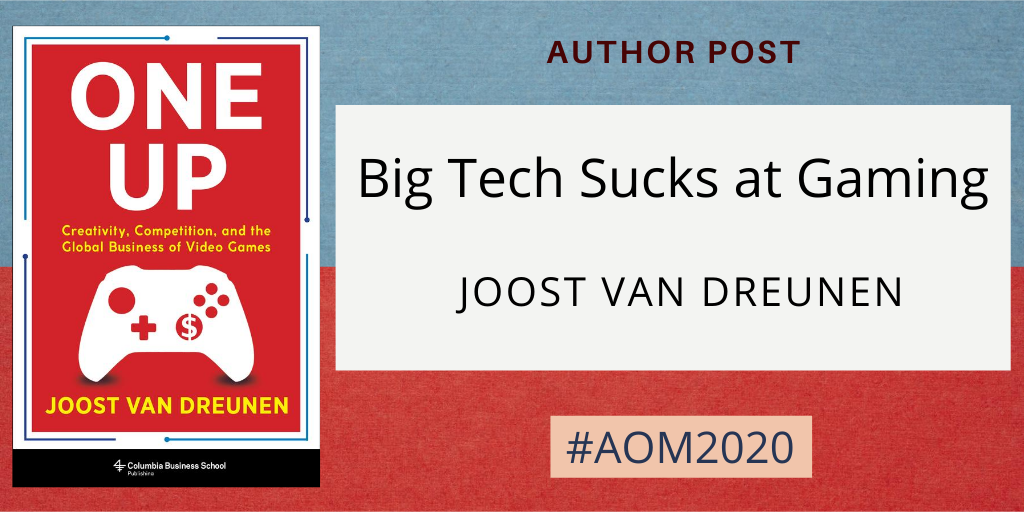Big Tech Sucks at Gaming
By Joost van Dreunen

“Joost van Dreunen’s One Up reflects his many years of experience and makes interesting observations about the games business, offering his unique perspective as a consultant and an academic. His positioning at the intersection between creators, manufacturers, business executives, investors, and financial analysts makes his book a must-read for anyone interested in learning more about the games business.”
~Michael Pachter, managing director and equity research analyst, Wedbush Securities
We continue our Academy of Management virtual exhibit today with a guest post by Joost van Dreunen, author of the forthcoming book One Up: Creativity, Competition, and the Global Business of Video Games. Joost van Dreunen, a widely recognized industry expert with over twenty years of experience, analyzes how game makers, publishers, and platform holders have tackled strategic challenges to make the video game industry what it is today. One Up offers a pioneering empirical analysis of innovation and strategy in the video-game industry to explain how it has evolved from a fringe activity to become a mainstream form of entertainment.
• • • • • •
The coronavirus lockdowns over the past months have focused attention on the games industry like never before—and for good reason. Video games have successfully transitioned from the fringes to the mainstream and are today an immensely popular form of entertainment. Annual spending on video games stands at $130 billion globally, and well over 2 billion people claim to play regularly.
It is precisely because of this growth that all of the major tech firms have developed an interest in gaming. Big Tech—Amazon, Google, Facebook, and Apple—are trying to penetrate and further expand their share in games. Having gone through a similar process with the music and video industries, these firms now hope to disrupt gaming and leverage it as a way to attract more people, especially younger people, to their services and products. Today, with the release of a new console generation just a few months away, industry observers are wondering: “Can Big Tech conquer the video games industry?”
So far, it’s not going so well.
Just a few weeks ago, we saw how Amazon stumbled when it released its first big title. Crucible, a shooter game. What was undoubtedly meant to be a declaration of its commitment and inevitable dominance over the category, but it flopped painfully. Amazon is also working on a cloud gaming service, but things have been eerily quiet on this front. Twitch, Amazon’s crown jewel, has been struggling to grow its ad revenue and lost several of its most popular streamers, including Tyler ‘Ninja’ Blevins, to rival platforms with deep pockets. And when it comes to physical game sales, Amazon has yet to dethrone GameStop, BestBuy, Target, and Walmart. After Amazon acquired Double Helix in 2014, many predicted that the biggest online store owner in the world would swiftly disrupt the games industry. But six years later, none of that has happened.
“After Amazon acquired Double Helix in 2014, many predicted that the biggest online store owner in the world would swiftly disrupt the games industry. But six years later, none of that has happened.”
Another relative newcomer, Google, is always going to be a bridesmaid in games but never a bride at this rate. Its earnings and offering have stayed in Apple’s shadow, despite its much broader user base. And on YouTube, a Google property, gaming has long been a major content category after music. Despite a rapid rollout of a livestreaming service, YouTube earned itself a familiar second position. (In fairness, Microsoft tried a similar move with the livestreaming platform Mixer, didn’t even get close, and threw in the towel recently.) The app YouTube Gaming continues to suffer from its own opaque algorithms. Most of the titles that were announced last year at the industry’s biggest convention, E3, ended up contributing to the demonetization of video creators because they featured content that upsets the sensibilities of YouTube’s advertiser clients.
This is probably why Google decided to launch its cloud gaming service, Stadia. When the CEO showed up to announce Google’s vision for the future of games, people believed it was a sign of how serious Google is about gaming. Now, more than a year later, its service is only incrementally improving, and Google has all but lost the first-mover advantage it previously held over its rivals. According to one senior executive with whom I spoke, “Google is committed, but it’s not all in.”
Facebook seems to have had the hardest time of all. It initially enjoyed an unexpected popularity with social games as its users flocked to titles like FarmVille in between sending messages to their friends and families—but the genie slipped out the bottle when Facebook was late to transition to mobile. It has been chasing that first high ever since.
Facebook had its own digital distribution platform, acquired Oculus for $2 billion, and more recently started investing its livestreaming service. Certainly, Facebook has proven eager to spend and acquire. But so far it has not managed to show a big return, as video games fit awkwardly into the company’s ad-based revenue model. None of Facebook’s attempts seem to stick.
“None of Facebook’s attempts seem to stick.”
It is tempting, of course, to point at Apple. It rules the mobile segment, generating $11 billion in revenue in 2018. However, much of Apple’s success was an accident rather than a planned effort to penetrate the games industry. In fact, Steve Jobs, after spending his early years at Atari, always held a strong contempt for video games. Nevertheless, he gleefully reported during a 2010 Apple event that, while his firm had not “set out to compete with Nintendo or Sony on their PSP, [. . .] we are now a significant part of that market.” As PC gaming started to grow over the past decade, Apple barely managed to benefit because it does not prioritize game development for its Mac hardware. To Apple, games are a means to an end, not a passion.
Nevertheless, success for Apple creates new problems entirely. Its App Store is a tangled mess of millions of applications where developers struggle to stand out and end users struggle to navigate. The launch of the Apple Arcade, a subscription-based service aimed at consumers who prefer to “pay once and play,” has been marred by its highbrow offering. After spending several hundred million dollars on acquiring exclusive content, the service has not been able to attract a critical mass of users despite Apple’s enormous install base.
“Due to its vast network of investments, Tencent is quickly becoming the gatekeeper to all of Asia for Western game companies.”
The one firm that bucks the trend is Chinese titan Tencent. With dominance over its domestic user base due to regulatory requirements (foreign firms can release content in China only if they partner with a domestic firm), Tencent is eagerly looking for properties in Southeast Asia, Europe, and North America. It acquired some of the most successful game companies in the history of the industry, including Riot Games, which created League of Legends (an online multiplayer game with 100 million active players at its peak), and Supercell, known for Clash of Clans and Clash Royale. Both of these firms generate billions in revenue annually. Tencent offers a familiar mix of content for PC, console, and mobile, combined with live streaming services. And it is currently beta-testing its cloud gaming offering. Due to its vast network of investments, Tencent is quickly becoming the gatekeeper to all of Asia for Western game companies.

Looking at the current exposure to gaming among major tech firms, we can see the writing on the wall. Big Tech will have to commit or move on. Combined, Amazon, Google, Facebook, and Apple control just about $20 billion in the games industry, compared to $31 billion for two of the major incumbents, Microsoft and Sony, who remain firmly in charge at the top. More so, for games to become a meaningful part of their operations, Big Tech needs to grow their share of the market well beyond the 3% they currently hold. Each makes substantially less in revenue and controls a much smaller market share than their incumbent competitors.
Knowing how Big Tech firms have dealt with content industries previously, it seems likely that they will continue pushing into the games industry, and that they will do so by increasing their spending. With music and movies, Big Tech had a relatively easy time throwing a bunch of money around to obtain platform-exclusive content, but this strategy is proving to be less fruitful in gaming. Most successful titles depend on positive network effects and have made multiplayer game play central to their appeal. Platform exclusivity does not make sense in that context. With the exception of outright acquiring one of the major publishers, Big Tech will have a really hard time—and likely no interest—in establishing themselves as content creators.
Is the games industry different now than it was twenty years ago? Absolutely! Can Amazon, Google, Facebook, and Apple claim it for themselves, as they’ve done in so many other industries? We’ll see. For now the great disruptors of our time are all playing defense.






